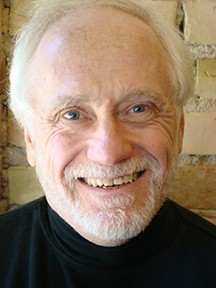David Clowers On Teaching Poetry
- Share
- Tweet
- Pin
- Share

David Clowers. Submitted photo.
David Clowers builds his Learning in Retirement poetry seminars around the idea that “we are students and teachers to each other.”
Clowers has been teaching the classes as part of the Learning in Retirement series for about eight years. The classes he teaches range from nature poetry, to poetic forms, lines in poetry, and metaphor.
Each class begins with a syllabus and is centered on the students out-of-class writing assignments. Students bring their finished, or unfinished poems to class, and provide each other with copies. They are read and receive constructive criticism. The classes are capped at 12 so that every student can share their poetry and receive feedback.
“Ten is better,” Clowers said, “You can’t do a good job with more, especially when there are teaching moments and you want to give examples.”
Most of Clowers’ students have graduated from college, are comfortably retired, and possess the capital necessary for taking a Learning in Retirement Poetry class. Many of Clowers students have not written since college and submitting their work to their peers can be difficult at first.
Sometimes Clowers’ students try to improve upon poetry they wrote while in college, to limited success.
“The original poems that they wrote when they were 20, fresher and more alive, which shows that youth has its energy and amazement at things, but after that, if you try to add craft to something spontaneous and heartfelt you might just kill it,” Clowers said.
The work of retirement-age poets is different from their work as undergraduates because they have lived more.
“From my own life, I can tell you, that when I was in my twenties, I was hungry for experiences, but hadn’t experienced a whole lot,” Clowers said, “I figured I needed to do everything.”
Clowers was an instructor of English at Drake University, and holds a BA from Kalamazoo College, an MA from the University of Michigan, and a JD from the University of Chicago. Clowers planned on teaching law, but instead began to practice.
“My approach to teaching when I taught was completely different than the way I teach now,” Clowers said.
In the class titled “It Could Be Verse,” students study the structure and composition of sonnets and pantoum. Classes meet for two hours, once a week for six weeks.
“To start with, people have problems,” Clowers said. “But it gets easier.”
In addition to teaching and practicing law, Clowers also writes poetry.
“Funny stuff is what I’m best known for around here,” he said. A sticker on a banker’s nametag recently inspired his poem “Relationship Banker.” Clowers writes:
Who knew relationships
could be banked, I thought,
and saved perhaps against
some future rainy day?
His students tend to avoid the humor though.
“They take themselves pretty seriously,” he said.
